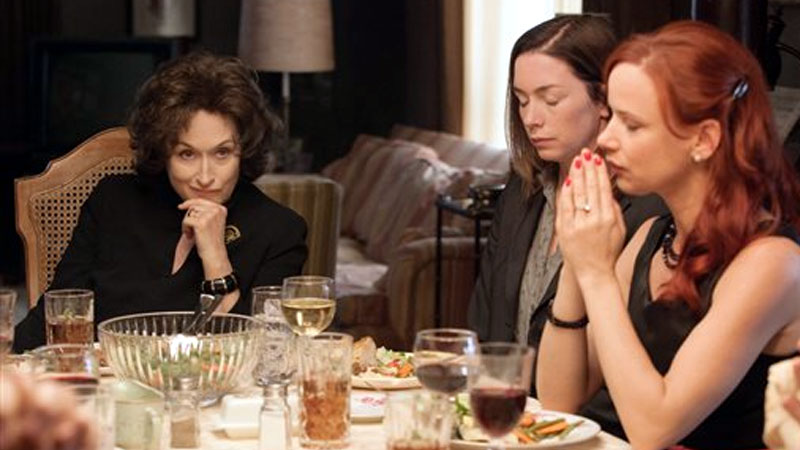
This image released by The Weinstein Company shows, from left, Meryl Streep, Julianne Nicholson and Juliette Lewis in a scene from “August: Osage County.” AP
Planning some extended family dinners over the holidays? Worried that folks might not get along, that festering tensions might surface, that people might get tipsy and say too much?
Well, here’s an idea: First, go see “August: Osage County,” the blistering film adaptation of the Pulitzer-winning Tracy Letts play starring Meryl Streep and Julia Roberts.
Because once you’ve witnessed the rollicking, vicious family dinner that’s the dramatic centerpiece of this movie, you’ll know you’re safe. No family meal of your own will ever seem truly unpleasant after you’ve witnessed this scene. Festering tensions? Try brutal wounds, caused by the bitterest of insults lobbed across the table with those mashed potatoes. The kind of insults that only those closest to you — we’re talking family — could ever dream up.
This image released by The Weinstein Company shows Chris Cooper, left, and Benedict Cumberbatch in a scene from “August: Osage County.” AP
It is, of course, delicious that the most biting of these insults come from the mouth of the one and only Streep, who holds absolutely nothing back in a performance that could be called showy — except that’s it’s so compelling, and also deeply faithful to the script. Violet Weston, the 65-year-old matriarch of an Oklahoma clan, is simply one of the most spectacularly damaged characters in memory. And as written by the hugely talented Letts, who has both playwriting and acting Tonys to go with his Pulitzer, she’s someone you’ll want to meet — if only once.
Not that “August: Osage County,” directed by John Wells, works best as a movie, even with a screenplay by Letts himself. Those who saw the 2007 Broadway production will likely recall a nearly perfect theatrical experience, one that left you drained but grateful after three hours.
It feels less naturally suited to film, though if you haven’t seen the play, you might not notice. And a brief final scene feels tacked on for cinematic purposes. But these are not fatal flaws.
Virtually all the action takes place in one home, in the heart of the Oklahoma plains, stifling in the August heat. It belongs to Violet and her husband, Beverly, a 69-year-old poet and raging alcoholic. “My wife takes pills and I drink,” he says. “That’s the bargain we’ve struck.”
And, boy, does Violet take pills. It’s a shock to see the regal Streep looking this way: wrinkled and pale, with a craggy fuzz of gray hair peeking out of a dark wig, a result of chemotherapy for mouth cancer. She has stains on her baggy sweater and can’t keep her balance. She still smokes, and tufts of that smoke linger in the stifling air, because she doesn’t believe in air conditioning. Plastic shades are taped shut, blocking out natural light.
Extended family is summoned home when emergency strikes: Beverly’s disappearance. All are forced to sit together, talk together, eat together, and of course face some serious family truths. The nature of those truths won’t be revealed here, except for the truth that it would be hard to assemble a more accomplished cast.
Margo Martindale, especially, is absolutely pitch-perfect as Violet’s sister Mattie Fae, at once boisterous, flighty, warm, and witheringly insensitive to her awkward adult son, Charlie (Benedict Cumberbatch.) Or, as Mom calls him, Little Charlie, which should tell you a lot.
Also wonderful is Chris Cooper as Mattie Fae’s long-suffering husband, and Julianne Nicholson as the lonely and misunderstood Ivy, one of Violet’s daughters. The top-flight cast also includes Sam Shepard, Juliette Lewis, Ewan McGregor, Abigail Breslin and Dermot Mulroney. (And it’s co-produced by George Clooney, no less.)
Much depends, though, on the dynamic between Violet and daughter Barbara (Roberts), who’s in the throes of a disintegrating marriage. This is one of the meatiest roles Roberts has had in a good long time, and she handles it with an admirable lack of vanity. Gone is that high-wattage Roberts smile. Barbara is weary, bitter, and, at times, shrewish.
Watch her in that dinner scene, trying to dodge her mother’s verbal missiles, until she no longer can. Come to think of it, though, watch absolutely everyone in that scene.
And then plan your own family dinner, secure in the knowledge that it could never, ever be as bad.
___
“August: Osage County,” a Weinstein Company release, is rated R by the Motion Picture Association of America for “language including sexual references, and for drug material.” Running time: 121 minutes. Three and a half stars out of four.